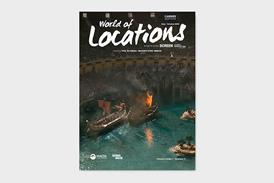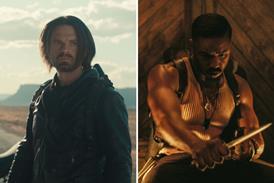Dir: Mel Gibson. US. 2004. 127 mins.
It has become difficult to think about The Passion Of The Christ without being influenced by the storm of passion it has stirred up over the last six months, and some of the questions raised. Is it an act of hubris on the part of Mel Gibson' Is it anti-semitic' Is it a dangerous tool designed to incite hatred' Is it a monumental error of judgement of the politically sensitive times we live in' Well the film is finally here to assess - as a film - and the (earthly) good news is that Gibson has delivered a genuinely startling and traumatic vision of the final 12 hours in the life of Christ filled with the directorial flourishes and command of craft which weren't so readily on show in Braveheart.
It's a very unambiguous focus which Gibson has steered to the screen. He doesn't give us anything but the most cursory of glimpses into Christ's life or teachings before the betrayal at the Garden Of Gethsemane where the film kicks off. He is here to bring us the Passion - the excruciating, pre-ordained physical suffering and humiliation undergone by Christ on the way to the cross and on it. And that is what he shows - excruciating suffering.
Early press screenings have divided audiences, not so much by faith, as by who can stomach the violence and who can't. And it is that issue which will become the film's newest controversy, as hordes of the faithful start paying to see it across North America this week.
Ironically it is this very relentless violence inflicted on Christ in the film which infuses it with a primeval power rarely seen in cinema these days. Gibson's goal - to show the level of abuse endured by Christ for the sake of man -- is realised with no small amount of success and he erases the respectful Passions previously put to celluloid in moments.
Is it more than a one-trick-pony' Perhaps not. It risks monotony in a couple of stretches, it rarely attempts characterisation and it follows the gospels, dare one say it, religiously. But there is something compulsive in watching the spectacle of Christ's agonies, rather like a public execution in days of old, especially when you know that the ending, finally, will be a happy one. Christ, does, after all, rise from the dead, so how bad can it be to watch him being brutally beaten and savagely killed'
Assuming that believers embrace it, the film will be a significant box office success. And embrace it they will, for Gibson's open-hearted belief in his subject is in every frame, even if parents will be wary of exposing their children to such an intensely visceral experience.
In addition, there will be few non-believers who are not already intrigued by what Gibson has to say on the subject, especially in the light of the blanket press coverage across the world. Its longterm value in ancillary media is potentially gigantic; this is a timeless piece which has religious and educational applications for many years to come.
As for the fact that the film is acted in the languages in which would have been spoken at the time - Aramaic, Latin and Greek, exhibitors shouldn't worry. Dialogue is not the top priority here and anyone familiar with the story will be familiar with many of these words already. More pressing an issue is how it will be considered during awards season at the end of the year: should it be nominated as a foreign-language film' Or should there be a new category for dead-language film'
The Passon Of The Christ is a director's film and, while the three principal actors - Jim Caviezel as Jesus, Maia Morgenstern as Mary and Monica Bellucci as Mary Magdalene - are fine, they come second to the religious fervour at the film's heart. For that reason, the myriad images of sadistic attacks on the body are what sticks in the memory more than individual performances. Gibson choreographs these assaults with such care and authenticity that the scenes possess a savage beauty and, uncomfortably, unusually for film in general, they evoke the agony of actual physical pain.
The $27m film, which was shot in Matera in Southern Italy and on soundstages at Cinecitta Studios in Rome, looks the part thanks to the design of Francesco Frigeri and the camerawork of Caleb Deschanel, who work in striking hues of muddy browns into which the red of the spilled blood blends. The score by John Debney has a percussive middle Eastern flavour reminiscent of Peter Gabriel's music from The Last Temptation Of Christ while also including the more traditional heavenly chorus.
Prod co: Icon Productions
US dist: Newmarket Films
Int'l sales: Icon Entertainment International
Prods: Bruce Davey, Stephen McEveety, Mel Gibson
Scr: Benedict Fitzgerald, Mel Gibson
DoP: Caleb Deschanel
Prod des: Francesco Frigeri
Ed: John Wright
Music: John Debney
Main cast: Jim Caviezel, Maia Morgenstern, Monica Bellucci, Mattia Sbragia, Hristo Naumov Shopov, Claudia Gerini, Luca Lionello





























No comments yet